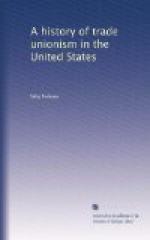American labor started with the “ideology” of the Declaration of Independence in 1776. Intended as a justification of a political revolution, the Declaration was worded by the authors as an expression of faith in a social revolution. To controvert the claims of George III, Thomas Jefferson quoted Rousseau. To him Rousseau was in all probability little more than an abstract “beau ideal,” but Rousseau’s abstractions were no mere abstractions to the pioneer American farmer. To the latter the doctrine that all men are born free and equal seemed to have grown directly out of experience. So it appeared, two or three generations later, to the young workmen when they for the first time achieved political consciousness. And, if reality ceased to square with the principles of the Declaration, it became, they felt, the bounden duty of every true American to amend reality.
Out of a combination of the principles of individual rights, individual self-determination, equality of opportunity, and political equality enumerated and suggested in the Declaration, arose the first and most persistent American labor philosophy. This philosophy differed in no wise from the philosophy of the old American democracy except in emphasis and particular application, yet these differences are highly significant. Labor read into the Declaration of Independence a condemnation of the wage system as a permanent economic regime; sooner or later in place of the wage system had to come self-employment. Americanism to them was a social and economic as well as a political creed. Economic self-determination was as essential to the individual as political equality. Just as no true American will take orders from a king, so he will not consent forever to remain under the orders of a “boss.” It was the uplifting force of this social ideal as much as the propelling force of the changing economic environment that molded the American labor program.
We find it at work at first in the decade of the thirties at the very beginning of the labor movement. It then took the form of a demand for a free public school system. These workingmen in Philadelphia and New York discovered that in the place of the social democracy of the Declaration, America had developed into an “aristocracy.” They thought that the root of it all lay in “inequitable” legislation which fostered “monopoly,” hence the remedy lay in democratic legislation. But they further realized that a political and social democracy must be based on an educated and intelligent working class. No measure, therefore, could be more than a palliative until they got a “Republican” system of education. The workingmen’s parties of 1828-1831 failed as parties, but humanitarians like Horace Mann took up the struggle for free public education and carried it to success.




